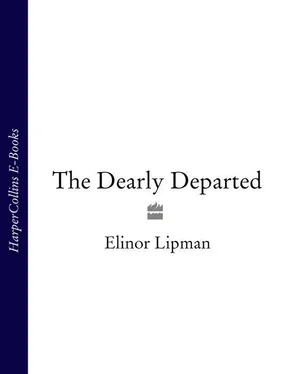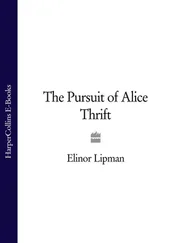“A dollar a day—and that includes utilities.”
“And you think I could get it?”
The agent confided, “They don’t check, so lay it on a little thick in the application. They like widows and orphans—the more the better.”
“I only have Sunny.”
The agent said, “I happen to know from personal experience that if they like you, they’re not sticklers.”
The truth would have been nowhere near good enough: Margaret had lost a husband in the most prosaic fashion, to nothing more tragic than an uncharacteristic slip—hers. She still couldn’t believe she had sinned and that the perfectly decent John Batten, who updated kitchen cabinets with laminates, had not forgiven her. It hadn’t even been a love affair but a temp job, a professional courtesy: The lawyers for whom she worked had loaned her and her shorthand skills to an out-of-town client running for Congress. He hadn’t announced yet; he told the newspaper that he was visiting primarily on business and, yes, maybe to shake a few hands along the Saint Patrick’s Day Parade route. And when he did, as Margaret would observe, it was with such penetrating eye contact and warm, two-fisted handshakes that the woman in his grip felt more attractive and interesting than she knew herself to be.
Pretty in a round-faced, wholesome way; short, with a generous bust and small waist, Margaret was in her mid-twenties and looked eighteen. Safe, her employers thought. Not bait. Harmless as a secretarial loan to a reputed womanizer. At the end of Miles Finn’s visit, after two days of depositions, he invited her to dinner, in a hotel dining room famous for its Caesar salads prepared at the table.
Thank you, but she couldn’t, Margaret said.
“A previous engagement?”
“I’m married.”
“I am too! This isn’t a date. I’m so sorry that’s what you thought. This is a thank-you for a job well done and a grueling two days of boring testimony. Dinner seems the least I could do.… Perhaps your husband would like to come along.”
“He’s on a job,” she said.
“Out of town?”
“Camden,” she said. “A school renovation. It’s supposed to open the day after Labor Day.”
She seemed torn, concerned about something other than the appearance of social impropriety. Her hands ran down the sides of her brown cotton A-line skirt.
“What if we made it for seven or eight?” he prompted. “That way you can go home and change into something for evening.”
She nearly curtsied with relief, and said, “I do have something new I was saving for a special occasion.”
“How old are you?” he asked. “I only ask because I’d like to toast my campaign.”
“I’m twenty-six!”
“Twenty-six.” He smiled.
He asked for a quiet table, away from other diners. Margaret arrived in what his wife would call a little black dress, poofy and crisscrossed with chiffon at the bosom, in very high heels that looked a size too big, and carrying a long, thin clutch purse with a rhinestone clasp; a heart-shaped barrette held her brown hair off her shiny forehead. She ate her Caesar salad and her veal rollatini with such earnestly exquisite shopgirl manners, refusing to speak until she had chewed and swallowed every morsel of food and washed it down with a ladylike sip from her water goblet, that he felt chivalrous, which, in turn, impelled him to invite her upstairs to have Kahlùa on his balcony. He wanted to flatter her; wanted this sweet-faced girl to feel that she had been an excellent dinner partner and that Miles Finn enjoyed her company. If he needed a secretarial pinch-hitter again—say, next month?—could she get away?
She shouldn’t have spent the night, shouldn’t have assumed that her heretofore nonpregnant state was her failing and not her husband’s; should have checked her good black dress for the long, prematurely silver hairs that John removed with tweezers and saved in an amber pill bottle. He filed for divorce, gallantly characterizing it as no-fault. Their two lawyers privately agreed upon a paltry monthly payment in lieu of a paternity test.
When no one had a good word for John Batten, the brute who divorced his sweet, pregnant wife, Margaret told her family, “It’s not what it appears to be. Don’t blame John. That’s all I’ll say,” and took her wispy-haired baby girl to King George, a town in the shadow of the White Mountains. Candidate Finn had recommended it unwittingly as the site of idyllic boyhood summers and a future retirement. John Batten moved his laminating business to a booming Phoenix and sent Margaret a wedding announcement ten months later. “She’s a keeper,” he wrote in one ecru corner.
Believing that the bungalow on the golf course would provide a month or two’s shelter, Margaret typed in the space allowed that she had been briefly married to a wonderful man, who had died an accidental death in a helicopter crash. In parentheses, she wrote that her late husband flew critically ill people, or sometimes just their hearts and kidneys, from the scenes of accidents to hospitals, from country to city, where teams of specialists met him atop hospital helipads. He had died in the line of duty, whereupon his organs and corneas were harvested and transplanted into no fewer than five near-death breadwinners. The committee for the Abel Cotton House had considered the poorly punctuated appeals of too many teenage mothers who came to interviews in cutoff jeans. Times had changed. Runaway slaves had given way to war widows, who’d given way to church-sponsored refugees with extended families. English-speaking applicants were scarce; people who would fit in were scarcer. With a house in suburban Philadelphia as her last address, an associate’s degree, a dented Pinto, a thin, sad gold band and diamond chip on her widowed left hand, and a little blond daughter, the soft-spoken Margaret Batten was the happy choice of every philanthropist on the committee.
The invitation to act with the Community Players brought changes for the better for Sunny: Her mother took her to the movies now that she had techniques to study, gestures to borrow, dresses to copy. Dusty blues and greens accented her eyelids, and her fingernails went pink. She began squirting hand cream into new rubber gloves by day and massaging her heels at night. Various upstanding professionals, including an optometrist and a pharmacist, took Margaret out for bites to eat after Thursday rehearsals.
Her fellow thespians uncovered a talent Margaret didn’t know she had, the ability to memorize lines more quickly than anyone else—not just her own, but the whole cast’s. “Photographic memory,” she’d apologize, unable to swallow the prompts when her fellow actors missed their cues. She understudied both leading ladies and ingenues, and finally had her break when the woman playing Mrs. Winemiller in Summer and Smoke needed emergency disk surgery. Sunny ushered at her mother’s opening night, and was both pleasantly surprised and disconcerted. Margaret became someone else onstage, gesticulating, enunciating, and projecting, in an accent that was all Blanche DuBois. Sunny thought she looked pretty at a distance with her face painted and her taffeta church outfit rustling, prettier than she looked in real life. The Bulletin ’s freelance drama critic, who taught at King George Regional and had Sunny in driver’s ed, reported that “newcomer Margaret Batten brings an understated ardor and energy to the role of the minister’s wife.” It was a gift to an unattached, shy, forty-three-year-old woman in a town where everyone read the same newspaper. Men in the KGCP teased her. The crème de la crème of King George society, she liked to say, was opening its circle to her. The bachelor Players called her at home, asking for “Maggie.” Confidence changed the way she dressed, the way she drove—with a chiffon scarf tied around her neck, in Grace Kelly fashion—and the way she entertained. She rented a floor sander, polyurethaned the pine boards to a high gloss, and painted the front room in a color called Caviar. When the KGCP needed sites for their annual progressive dinner, Margaret energetically volunteered what she now was calling the Cotton homestead for the canapé course.
Читать дальше












